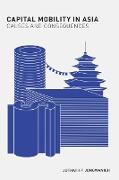Capital Mobility in Asia
BücherAngebote / Angebote:
Asia has benefitted greatly from its integration into the world economy. But globalization has its challenges, including those that are the subject of this excellent new study: how to manage the interface with global capital markets, especially in the current, highly unusual monetary policy settings in the major economies. Dr Juthathip Jongwanich has been researching these issues for several years. In this volume she writes with great authority, providing a comprehensively, succinct and accessible examination of the many complex issues. A must-read volume for policymakers and academics alike." -- Hal Hill, H.W. Arndt Professor of Southeast Asian Economies, Australian National University "A very timely and excellent book on capital volatility. Jongwanich provides a superb analysis on the impact of capital flows on home country, exchange rates and the capital account policies. A very important book, especially for academia and policymakers." -- Muhamad Chatib Basri, Former Finance Minister of Indonesia "This timely book presents outstanding research on the determinants and effects of capital flows as well as the effectiveness of capital control policies in dealing with volatile capital flows in emerging Asian countries. It will be a useful and valuable reading for researchers and policymakers to understand the nature of cross-border capital movement and design the policies conducive to more stable and sustainable economic growth." -- Jong-Wha Lee, Professor of Economics and Director of Asiatic Research Institute, Korea University "This is an important book. Ever since the East Asian financial crisis, it has been recognized that emerging market economies are vulnerable to both excessive inflows of capital and sudden outflows. But up until now there have been few detailed empirical studies of this issue. This book looks at the key factors determining capital mobility, considers the impact of capital flows, especially on real exchange rates, and examines the possibility of effective capital controls. Jongwanich draws two key conclusions: shifting the mix of inflows towards FDI is possible and desirable, and well-functioning domestic financial markets are essential if capital inflows are to be well used." -- David Vines, Professor of Economics and Fellow of Balliol College, University of Oxford
Folgt in ca. 10 Arbeitstagen




